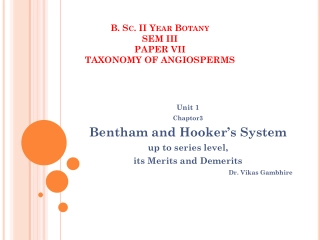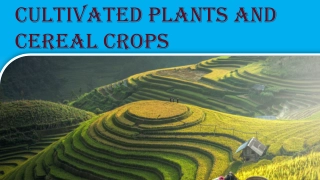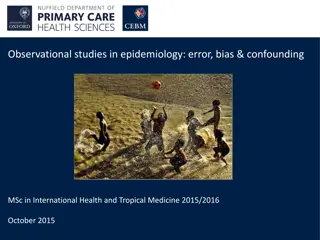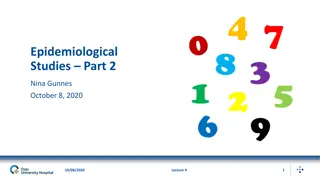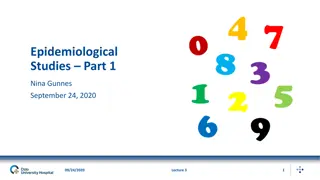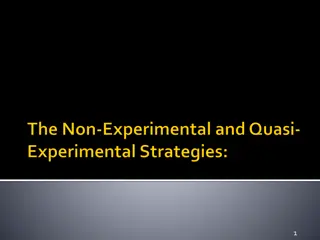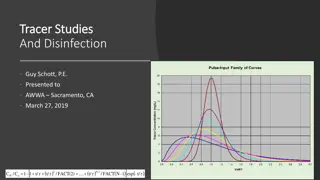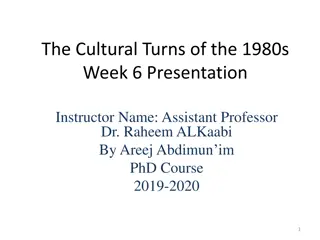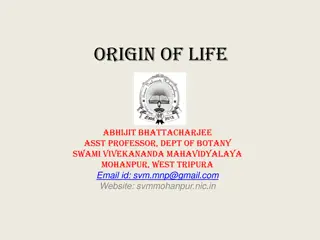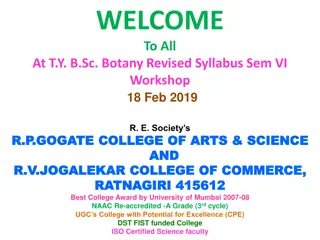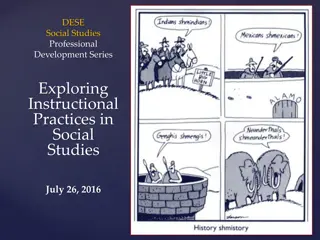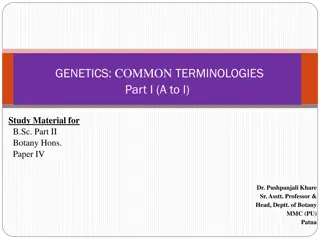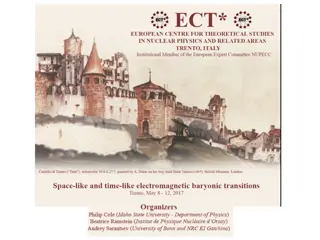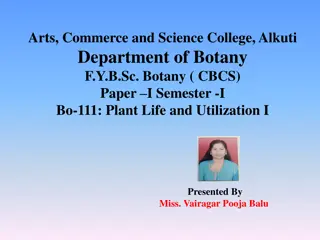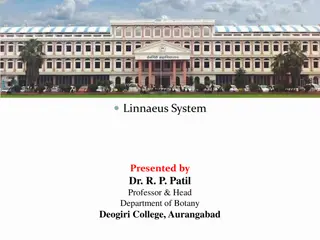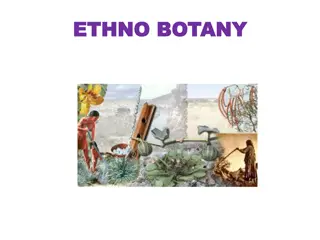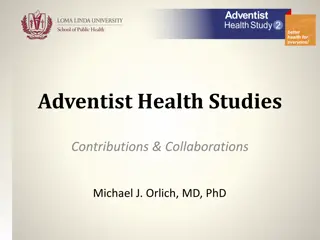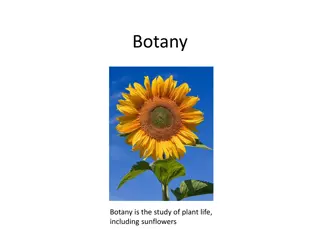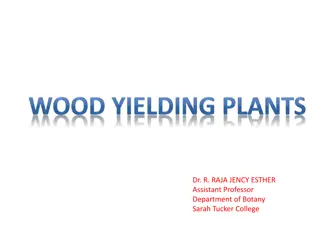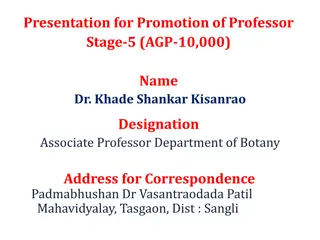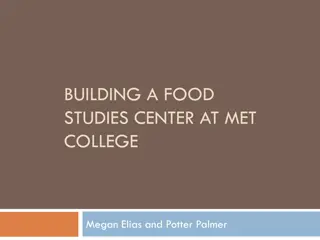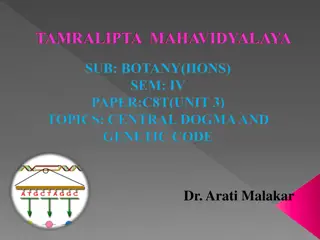Bentham and Hooker's System of Classification in Botany
Bentham and Hooker's system of classification in botany is a natural system based on a large number of characters considered simultaneously. Proposed by British taxonomists George Bentham and Joseph Dalton Hooker, this system categorizes seed plants into classes, orders, families, and genera. It is
2 views • 10 slides
Agriculture and Economic Botany Overview
Explore the world of cultivated plants and cereal crops, diving into the branches of economic botany such as agriculture, horticulture, forestry, and more. Learn about crop classification, including based on growing season, use, and economic importance. Discover the pioneers of crop production like
1 views • 48 slides
If you are looking for Mobile Mechanic in Port Botany
If you are looking for Mobile Mechanic in Port Botany, Max Motorworks is your Go-To Mobile Mechanic Service! Experience hassle-free automotive care right at your doorstep. Our skilled technicians provide quality repairs, routine maintenance, and diagnostics. If you are looking for car repairs, car b
0 views • 6 slides
Remarkable Opportunities in Higher studies after Civil Engineering
Higher studies after Civil Engineering in Tamil Nadu\nCivil engineering stands at the forefront of shaping our physical environment; from the infrastructure we rely on daily to the sustainable development of our cities. Further, pursuing Higher studies after Civil Engineering opens up countless oppo
0 views • 2 slides
Latest Research and Studies on Lung Cancer - Update May 2024
This research update includes information on national recruitment to lung cancer studies, comparison of national vs. regional recruitment, and detailed descriptions of various studies and trials related to lung cancer. The studies cover areas such as treatment advancements, observational studies, ma
2 views • 13 slides
Understanding Observational Studies in Epidemiology
Delve into the realm of observational studies in epidemiology, exploring concepts such as error, bias, and confounding. Discover the significance of various study designs, from case reports to prospective cohort studies, in elucidating associations and establishing causality in non-communicable dise
0 views • 58 slides
Overview of Cohort Studies in Epidemiology
Cohort studies are a type of observational study where a group of healthy subjects is followed over time to investigate relationships between exposures and outcomes. They provide valuable insights into disease development and risk factors, offering advantages like assessing multiple exposures and en
0 views • 21 slides
Overview of Ecological Studies in Epidemiology
Ecological studies in epidemiology involve studying groups of individuals at a population level to examine the correlation between exposure and disease occurrence. While cost-effective and useful for generating hypotheses, ecological studies have limitations, such as the inability to control for con
3 views • 21 slides
BSc in Strategic Studies & International Relations at KDU
The Faculty of Defence and Strategic Studies at KDU offers a hybrid BSc degree in Strategic Studies and International Relations to prepare skilled professionals in national security and foreign relations. The program aims to develop theoretical and research skills for analyzing international politic
0 views • 8 slides
Overview of Media Studies Disciplines and Historical Development
Media studies is a multidisciplinary field that explores the content, history, and effects of various media, with roots in the relationship between media and culture. Originating in the 1920s, media studies draws on traditions from social sciences and humanities, incorporating theories from discipli
5 views • 18 slides
Understanding Post-Authorisation Safety Studies (PASS) in Pharmacovigilance
Post-Authorisation Safety Studies (PASS) are conducted after a medicinal product is authorized to gather more safety information or assess risk management effectiveness. These studies evaluate the safety and benefit-risk profile of the product, aiding regulatory decision-making. PASS aims to identif
0 views • 4 slides
Understanding Nonexperimental and Quasi-experimental Studies
Nonexperimental and quasi-experimental studies resemble experiments but lack random assignment, making them valuable for group comparisons without establishing causation. This type of research design looks at differences between groups that already exist, focusing on group differences rather than ca
1 views • 35 slides
Understanding Tracer Studies and Disinfection in Water Treatment
Tracer studies play a crucial role in determining hydraulic efficiencies and disinfectant exposure times in water treatment processes. This presentation by Guy Schott covers the purpose of tracer studies, water age distribution, disinfection exposure time, CT disinfection, log inactivation, and more
0 views • 34 slides
The Cultural Turns of the 1980s in Translation Studies
This presentation explores the various cultural turns in Translation Studies during the 1980s, highlighting key scholars such as Snell-Hornby and Even-Zohar. It discusses the linguistic turn, pragmatic turn, and the significance of cultural studies in understanding translation processes, particularl
0 views • 30 slides
Understanding Clinical Trials: Types and Designs
Clinical trials are essential research studies that evaluate new tests and treatments to improve human health outcomes. They involve various phases, designs, and purposes, such as treatment trials, prevention trials, and observational studies. Different types of clinical trial designs include experi
7 views • 18 slides
Breast Cancer Research Updates and Recruitment Data Overview
This document provides updates on breast cancer research, focusing on recruitment data and studies conducted between 2019 and 2023. It includes information on national and regional recruitment to breast cancer studies, SWAG region lead network studies, and opened breast cancer studies in 2022/2023.
0 views • 13 slides
Uganda Stakeholders Meeting on DELIVER and B-PROTECTED Studies - June 19, 2019
Stakeholders in Uganda convened on June 19, 2019, to discuss the DELIVER and B-PROTECTED studies evaluating PrEP and the dapivirine ring in pregnant and breastfeeding women. The discussions included concerns about community involvement, reasons why women may hesitate to join the studies, and the enr
0 views • 9 slides
The Origin of Life and Plants: Insights from Abhijit Bhattacharjee, Asst. Professor of Botany
Explore the mysteries surrounding the origin of life and Earth, as discussed by Abhijit Bhattacharjee, an Assistant Professor in the Department of Botany. Delve into the concept of life being an urge of the Universe to understand itself and the intriguing hypothetical views on life's origins. Learn
0 views • 14 slides
Workshop on T.Y.B.Sc. Botany Revised Syllabus Semester VI at R.P. Gogate College of Arts & Science and R.V. Jogalekar College of Commerce
This workshop, held on 18th Feb 2019, introduced the revised syllabus for Semester VI of the T.Y.B.Sc. Botany program at R.P. Gogate College of Arts & Science and R.V. Jogalekar College of Commerce in Ratnagiri. The syllabus covers topics such as plant diversity, form and function, current trends in
0 views • 26 slides
Exploring Social Studies Instructional Practices: Professional Development Series
Join the DESE Social Studies Professional Development Series to delve into instructional practices in social studies. Connect with educators, explore pedagogy, and engage in hands-on activities like the Elephant and Giraffe exercise. Learn from ELA directors, Missouri Writing Project experts, and Ar
0 views • 14 slides
Pilot Studies in Advancing Dementia Care: Core Considerations
Pilot studies play a crucial role in exploring interventions, determining necessary modifications, assessing feasibility, and confirming stakeholder acceptance. They help in testing study protocols, assessing data collection procedures, and evaluating outcome measures. Feasibility studies are essent
0 views • 9 slides
Understanding Research Design in Botany: An Overview
Explore the fundamentals of research design in botany through topics like introduction, parts, features, and importance. Learn about the meaning of research, problem formulation, data collection, and different types of research approaches such as descriptive, applied, quantitative, and qualitative.
0 views • 19 slides
Genetics Common Terminologies - Study Material for B.Sc. Botany Hons.
This study material covers common genetic terminologies from A to I, including definitions of key terms such as allele, allopolyploid, amorph, anaphase, biotype, and more. The content explains concepts like genetic inheritance, chromosome behavior, and molecular biology fundamentals relevant to the
0 views • 12 slides
Hematological Cancer Clinical Studies Update and Recruitment Statistics
Latest update on hematological cancer clinical studies from the SWAG.Network Haematological Cancer Clinical Advisory Group, including national recruitment data, regional recruitment comparisons, open studies, and sample size information for ongoing studies. This comprehensive update covers a range o
0 views • 14 slides
Advances in Baryon Spectroscopy and Hadronic Matter Studies
Discussions at the meeting focused on interpreting HADES results for e+e- and meson production in hadronic reactions, with studies involving proton, pion, light, and heavy ion beams. The role of time-like electromagnetic transitions, baryon spectroscopy, and connecting hadronic matter studies were e
0 views • 12 slides
Career Paths After Completing TYBSc in Botany and Zoology
Explore the various career options available after completing BSc in Botany and Zoology, including opportunities in paramedical science, post-graduation, and Ph.D. Specialize in top fields like Biomedical Science, Genetics, and Ecology. Dive into teaching roles, research in government or private sec
0 views • 14 slides
Introduction to Botany: The Study of Plant Life
Biology, the science of living organisms, includes botany which focuses on studying plants' structure, living habits, and relationships. The plant kingdom is diverse, with some being microscopic while others are large trees. Cryptogams are flowerless plants that reproduce both sexually and asexually
0 views • 13 slides
Carolus Linnaeus - Father of Modern Botany and his Classification System
Carolus Linnaeus (1707-1778) is known as the Father of Modern Botany for his significant contributions to the field. He developed a systematic way of classifying species, introducing binomial nomenclature. Linnaeus published works like Systema Naturae and Species Plantarum, where he described and cl
0 views • 10 slides
Exploring the World of Ethno-Botany: A Comprehensive Overview
Ethno-botany, the study of plants used by primitive and tribal peoples, has evolved as an interdisciplinary science with relevance to various fields. From its origins in ancient societies to its modern-day importance in resource management and biodiversity conservation, ethno-botany plays a crucial
0 views • 41 slides
Understanding Targeted Clinical Investigation in Pharmacovigilance
Targeted clinical investigation plays a crucial role in pharmacovigilance by further evaluating significant risks identified in pre-approval clinical trials. This involves conducting pharmacokinetic and pharmacodynamic studies, genetic testing, interaction studies, and large simplified trials to ass
0 views • 12 slides
Genetics Common Terminologies Part II Study Material for B.Sc. Botany Hons.
Covering a range of genetic terms from J to Z, this study material provides insights into various concepts including gene components, genome elements, DNA regions, chromosome structure, gene relationships, inheritance patterns, and genetic variability. Designed for B.Sc. Botany Hons. students, it ex
0 views • 15 slides
Concentration and Minor Requirements for Bachelor of General Studies (BGS)
Bachelor of General Studies (BGS) students at Northwestern State University of Louisiana must complete a concentration consisting of 36 hours, with a minimum of 12 hours at the 3000 and 4000 levels taken at NSU. The popular concentrations are Social Science, Computer & Natural Science, and Arts & Co
0 views • 9 slides
Understanding Plant Families and Nomenclature in Botany
Explore the diverse world of plant families like DICOTYLEDON, APIACEAE, ASTERACEAE, and FABACEAE, along with the nomenclature principles in botany. Learn about the rich variety of species, economic significance, and naming conventions for plants. Discover the significance of terms like Holotype, Iso
0 views • 8 slides
Exploring Pesticide Monitoring and Contamination Studies in Maine
Mary Tomlinson's work with the Maine Board of Pesticides Control includes past studies on groundwater and surface water monitoring, ongoing monitoring initiatives, and future collaborative studies. The State Law mandates residue surveys to identify possible contamination sources and develop a pestic
1 views • 55 slides
Adventist Health Studies Contributions & Collaborations Overview
Adventist Health Studies have made significant contributions to understanding the health and longevity advantages of Seventh-day Adventists, particularly focusing on vegetarian diets and cardiovascular health. With a history spanning over 57 years and various cohort studies, these studies have provi
0 views • 12 slides
Overview of Botany: Study of Plant Life and Its Importance
Botany, the study of plant life, encompasses a wide range of topics from herbalism to modern scientific discoveries. Understanding botany is crucial as plants provide food, medicine, and essential products for life. This field has a rich history dating back to ancient civilizations and continues to
0 views • 9 slides
Insights into Various Trees and Their Uses in Botany
Explore detailed information about different trees including Teak, Indian Rosewood, Thespesia Populnea, and Casuarina Equisetifolia. Learn about their characteristics, uses in timber, medicinal properties, and distribution across tropical regions. Gain knowledge about botany from the descriptions pr
0 views • 14 slides
Research on Leaf Senescence in Morus Alba Linn by Dr. Khade Shankar Kisanrao
Dr. Khade Shankar Kisanrao, an Associate Professor in the Department of Botany, has conducted extensive research on the physiological aspects of leaf senescence in the sericultural crop Morus Alba Linn. With a Ph.D. in Plant Physiology, 30 years of teaching experience, and recognition as a guide for
0 views • 22 slides
Building a Food Studies Center at Met College
Establishing a Food Studies Center at Met College, driven by the merging of Food and Wine courses with Gastronomy programs, aims to integrate hands-on and academic approaches to food studies. Drawing inspiration from existing models like the Culinaria Research Centre and the Center for Regional Agri
2 views • 8 slides
Understanding the Central Dogma and Genetic Code in Botany
The central dogma in molecular biology explains the flow of genetic information from DNA to RNA to protein through transcription and translation. The genetic code is a set of rules translating nucleotide sequences into amino acids. It consists of codons that specify amino acids, with sense and signa
0 views • 23 slides
